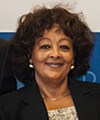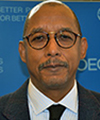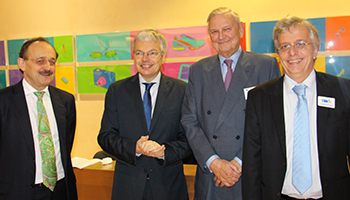Launch of the Atlas of the Sahara-Sahel, Brussels, 19 December 2014
| from left to right: Klaus Rudischhauser, Deputy Director General, Directorate-General for Development and Co-operation – EuropeAid; Didier Reynders, Deputy Prime Minister, Belgium; François-Xavier De Donnea, SWAC President; and Laurent Bossard, SWAC Secretariat Director |
Within the 2014 Sahel and West Africa Week, a high-level panel held debate on SWAC’s most recent flagship publication: An Atlas of the Sahara-Sahel: Geography, Economics and Insecurity. Based on a spatial and regional analysis, the 250-page publication including 150 maps and graphs, proposes a new reading of the region’s mobility and security challenges. The publication includes the views of regional and international policy makers regarding the region’s challenges. Didier Reynders, Belgian Deputy Prime Minister, Michel Reveyrand de Menthon, EU Special Representative for the Sahel, Mohamed Baye, Chief Co-ordinator of the SDS Niger-Sahel Strategy Executive Secretariat, Hiroute Guebre Sellassie, UN Special Envoy for the Sahel, Ibrahim Mayaki, Executive Director of the NEPAD Agency, and Klaus Rudischhauser, Deputy Director General for Development and Co-operation, EuropeAid of the European Commission, were among the key speakers. About 100 people took part in the official launch, which was transmitted via live stream. The press release was republished on more than 100 online platforms, in particular in West Africa. |
 |
|
 |
Didier Reynders, Deputy Prime Minister of Belgium "The Atlas provides a new reading of quite complex phenomena that the region faces. [...] It is an important tool for anyone trying to elaborate strategies for action". |
 |
Hiroute Guebre Sellassie, UN Special Envoy for the Sahel "The human and economic potential of the region can and should play a key role in changing the image of the Sahara-Sahel [...] The region can capitalise on a very young population, an increasingly open political sphere in which civil society actors are intensifying their participation, the use of economic resources for the benefit of people. [...] These are all very promising areas for the future of a region that has greatly suffered". |
 |
Michel Reveyrand de Menthon, EU Special Representative for the Sahel “The reality of the Sahara-Sahel is often not very well known, including by people who are generally interested in this particular region. The Atlas offers a mass of data and information in many fields: environment, economics, human relations and strategic thinking, making the Atlas an absolutely essential tool. [...] It contributes to improving the understanding of the strategic issue of this Sahara-Sahel universe.” |
 |
Ibrahim Assane Mayaki, CEO, NEPAD Agency “The Atlas is a valuable source of information laying the groundwork for long-term thinking. It is an extremely important contribution that will allow us to better reflect on the definition and implementation of our public policies in the Sahara-Sahel geographic context.” |
In the news
- An Atlas of the Sahara-Sahel: Geography, Economics and Security, OECDInsights blog, by Laurent Bossard, 19 January 2015
- Revitalising Trans-Saharan trade is a key to stabilising the region (French) article & interview with Laurent Bossard published by the Moroccan daily Le Matin, 30 December 2014
- An Atlas to help tackle the Sahara-Sahel’s multidimensional challenges, Afronline, 19 December 2014
- Building peace in the Sahel, a regional perspective, by Laurent Bossard, ECDPM Great Insights, 4 December 2014
- Africa No1 Podcast "Le Grand Débat"on security challenges in the Sahel", with Laurent Bossard, 1 December 2014
Related Documents


